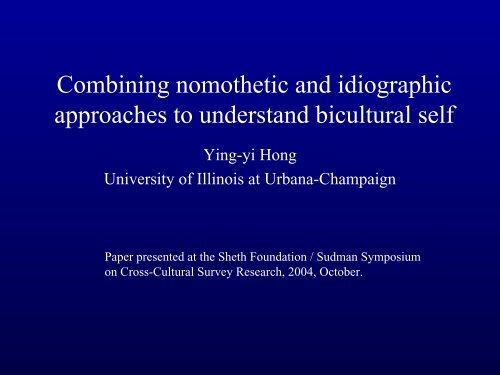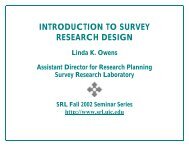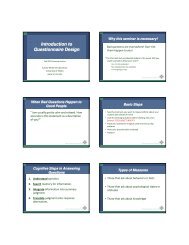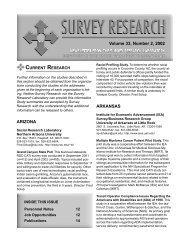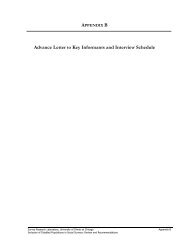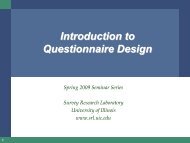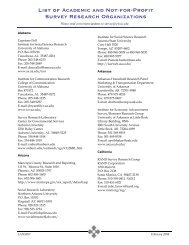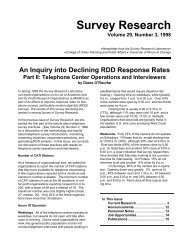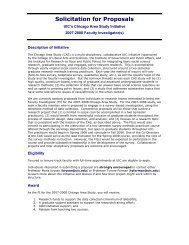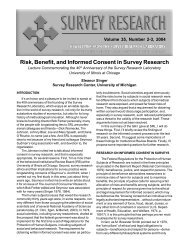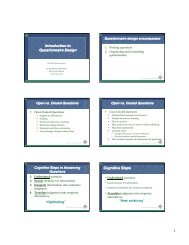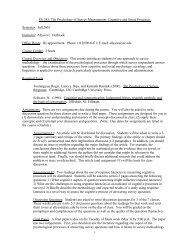Combining Nomothetic & Idiographic Approaches to Understand the ...
Combining Nomothetic & Idiographic Approaches to Understand the ...
Combining Nomothetic & Idiographic Approaches to Understand the ...
Create successful ePaper yourself
Turn your PDF publications into a flip-book with our unique Google optimized e-Paper software.
<strong>Combining</strong> nomo<strong>the</strong>tic and idiographic<br />
approaches <strong>to</strong> understand bicultural self<br />
Ying-yi Hong<br />
University of Illinois at Urbana-Champaign<br />
Paper presented at <strong>the</strong> Sheth Foundation / Sudman Symposium<br />
on Cross-Cultural Survey Research, 2004, Oc<strong>to</strong>ber.
Static approach<br />
Focuses on stable, static<br />
aspects of cultures<br />
Comparing cultures along<br />
some universal dimensions<br />
Makes inferences from <strong>the</strong><br />
score distributions of<br />
cultural samples<br />
Bicultural individuals are<br />
problematic and usually<br />
excluded from studies<br />
Dynamic constructivist<br />
approach<br />
(Hong et al., American<br />
Psychologist, 2000)<br />
Cultures are open systems<br />
subjected <strong>to</strong> changes<br />
Cultural differences are<br />
mediated by some domainspecific<br />
<strong>the</strong>ories<br />
Focuses on how cultural<br />
<strong>the</strong>ories mediate cognition,<br />
affect, and behavior<br />
Bicultural individuals are<br />
<strong>the</strong> targets of investigations
Overview<br />
<strong>Nomo<strong>the</strong>tic</strong> approach: Experiments that<br />
demonstrated how bicultural individuals can<br />
switch between <strong>the</strong> two cultural meaning frames.<br />
<strong>Idiographic</strong> approach: Narrative studies that<br />
examined <strong>the</strong> qualities of attachment of<br />
bicultural individuals <strong>to</strong> <strong>the</strong> two cultures.<br />
Common thread: bicultural individuals can<br />
dynamically switch between cultural frame, and<br />
<strong>the</strong> individual differences in <strong>the</strong> extent of doing so<br />
are linked <strong>to</strong> <strong>the</strong> implicit <strong>the</strong>ory of race.
Bicultural individuals<br />
American<br />
Chinese
Cultural priming<br />
Chinese
Cultural priming<br />
American
Chinese Cultural<br />
Primes<br />
Neutral Primes<br />
American Cultural<br />
Primes
Result Summary<br />
The Chinese (American) cultural cues heightened <strong>the</strong><br />
accessibility of <strong>the</strong> Chinese (American) cultural<br />
<strong>the</strong>ory. Subsequently, <strong>the</strong>se individuals will apply <strong>the</strong><br />
more accessible cultural <strong>the</strong>ory <strong>to</strong> <strong>the</strong> task at hand.<br />
Dependent measures:<br />
1. Internal versus external attributions (Hong, Chiu, et<br />
al., 1997, Hong et al., 2000; Hong et al., 2003)<br />
2. Cooperation versus competition in Prisoner’s<br />
dilemma game (Wong & Hong, 2003)<br />
3. Egocentric versus relational emotional projection<br />
(No & Hong, 2004)
Source: Hong, Y., Chiu, C., & Kung, T. M. (1997). Bringing culture out in front: Effects of cultural meaning<br />
system activation on social cognition. In K. Leung, U. Kim, S. Yamaguchi, & Y. Kashima (Eds.), Progress<br />
in Asian social psychology (Vol. 1, pp. 139-150). Singapore: Wiley.<br />
Likelihood of External Attribution (in %)<br />
60<br />
50<br />
40<br />
30<br />
20<br />
10<br />
0<br />
American<br />
Pictures<br />
"Neutral"<br />
Pictures<br />
Chinese<br />
Pictures
Results<br />
Likelihood of choosing <strong>the</strong> cooperative strategy in a<br />
Prisoner’s Dilemma game<br />
80<br />
75<br />
70<br />
65<br />
60<br />
55<br />
50<br />
45<br />
40<br />
Chinese Neutral American<br />
Primes
How does activation of different cultural knowledge<br />
system affect emotion?<br />
No and Hong (2004a): Korean-American college<br />
students participated in an emotional task (which is<br />
based on Cohen & Gunz’s, 2002, model of<br />
perspective taking on emotions):<br />
When I feel depressed, people around me usually<br />
feel: a. concerned<br />
b. depressed<br />
c. sad<br />
d. sympa<strong>the</strong>tic<br />
e. O<strong>the</strong>r emotion: (Please specify)
(No & Hong, 2004a)
Culture A Culture B Identity A Identity B<br />
Cultural Frame Switching<br />
Emotional<br />
Connections with<br />
<strong>the</strong> Cultures.<br />
Do bicultural individuals differ in <strong>the</strong> extent<br />
of frame switching? YES.
<strong>Idiographic</strong> approach: Narrative studies that<br />
examined <strong>the</strong> emotional attachment of<br />
bicultural individuals <strong>to</strong> <strong>the</strong> two cultures.
Our approach:<br />
Cultural Attachment Theory<br />
(Hong, Roisman, Chen, 2004)<br />
• Bicultural individuals can form independent<br />
attachment <strong>to</strong> <strong>the</strong> two cultures.<br />
• Attachment <strong>to</strong> culture is defined by <strong>the</strong> ability<br />
<strong>to</strong> freely evaluate experiences with <strong>the</strong> culture.<br />
Secure attachment <strong>to</strong> native culture<br />
insecure<br />
Secure attachment <strong>to</strong><br />
host culture<br />
insecure
Methodology<br />
Cultural Attachment Interview<br />
• Participants: 60 Chinese-American<br />
biculturals who were living in US;<br />
•19 standardized interview questions, with<br />
standardized probes (45~60 minutes);<br />
•Main questions: Participants were asked<br />
<strong>to</strong> generate 5 words <strong>to</strong> characterize <strong>the</strong>ir<br />
experiences with Chinese/American<br />
cultures, and <strong>the</strong>n substantiate <strong>the</strong>ir word<br />
choices with personal s<strong>to</strong>ries.
The interview pro<strong>to</strong>cols were adapted from Adult<br />
Attachment Interview (Main, Kaplan, Cassidy,<br />
1985; Main & Goldwyn, 1998; Hesse, 1999)<br />
–Overall consistency of narrative can reflect a<br />
person’s state of mind of security.<br />
Coding of <strong>the</strong> Narratives<br />
•Verbatim transcripts of interviews were analyzed<br />
in terms of overall coherence of communication<br />
according <strong>to</strong> Grice’s maxims of communications:<br />
Quantity, Quality, Relevance & Manner.<br />
•Instead of focusing on <strong>the</strong> positive/negative<br />
valence of words, we focus on how individuals have<br />
come <strong>to</strong> understand <strong>the</strong>ir bicultural experiences.<br />
•High inter-coder reliability: 85%+
JP: coherently describing<br />
both American and Chinese experiences<br />
[Chinese experience: Modest] :<br />
“For example, when I study in college, our class<br />
al<strong>to</strong>ge<strong>the</strong>r went on a picnic. Before we went <strong>to</strong> <strong>the</strong><br />
destination, <strong>the</strong> scenic spot, we were on <strong>the</strong> bus and<br />
some classmates ask me <strong>to</strong> sing. Honestly I like <strong>to</strong> sing,<br />
but in <strong>the</strong> group and sing in front of <strong>the</strong>m is kind of scary<br />
and I don’t want <strong>to</strong> show off. So I just said ‘oh ok you can<br />
go first.’ So I will let <strong>the</strong>m sing first <strong>the</strong>n after that <strong>the</strong>y<br />
kind of push me and I will say, ‘ok,’ I don’t want <strong>to</strong> give<br />
<strong>the</strong>m a sense and idea that I want <strong>to</strong> show off. ”<br />
─{coherent}
[American experience: Civil]<br />
“…from my American friends or from a stranger I<br />
met in <strong>the</strong> American society, I think <strong>the</strong>y are very polite,<br />
<strong>the</strong>y are very civil.<br />
For example, for <strong>the</strong> first time I went <strong>to</strong> Chicago, I<br />
kind of got lost. So I asked a stranger, we met at a gas<br />
station,”<br />
… “she has already done <strong>the</strong> job and she was going <strong>to</strong><br />
leave. But when I asked her, she just kindly showed me<br />
<strong>the</strong> directions. And when I, when I was leaving she also<br />
drove, you know, led me and pointed me <strong>to</strong> <strong>the</strong><br />
direction.”<br />
─{coherent}
CR: incoherently describing Chinese experience,<br />
coherently describing American experience<br />
[Chinese experience: Restricted]<br />
“like you can’t do whatever you want. You know. The<br />
culture is very, ah, restricted. It tries <strong>to</strong> force you <strong>to</strong> go <strong>to</strong><br />
a certain directions, it’s always shaping you. It’s like<br />
putting great pressure on you.”<br />
…… “Yeah, for example, when I was a kid I don’t<br />
want <strong>to</strong> study, I had <strong>to</strong> be a good student because that’s<br />
what, you know, that’s what everybody else expected,<br />
that’s what <strong>the</strong> culture. I think that’s a good thing, you<br />
know. If I want <strong>to</strong> be a musician, if I want <strong>to</strong> be an artist,<br />
that’s not considered a great career path.”<br />
…. “Nothing happened, so I, I just, so I studied hard.<br />
But I really didn’t like <strong>the</strong> things I studied. I mean, I<br />
wanted <strong>to</strong> be more free, I wanted <strong>to</strong> do whatever I want, I<br />
really don’t, I didn’t have a, a goal before, as everybody<br />
else did…”<br />
─{incoherent}
[American experience: Cold]<br />
“I was staying with a guy, <strong>the</strong> host family, and he’s<br />
like, he never really cared his parents like my parents<br />
would care for my grandparents. He said he didn’t get<br />
along with his mom or dad.”<br />
…. “we just talked about random things and I don’t<br />
remember why we start talking about relationship<br />
between parents and kids. And he just said, if his parents<br />
die, he wouldn’t feel <strong>to</strong>o bad about it.”<br />
…. “one time, his niece had a birthday, so she invited<br />
me and him <strong>to</strong> <strong>the</strong>ir house. ”<br />
…. “ ‘can we get her something for her birthday?’<br />
And he’s like, ‘don’t worry about it, we’ll write her a<br />
check for 20 dollars.’ I was shocked.”<br />
─{coherent}
TQ: coherently describing Chinese experience,<br />
incoherently describing American experience<br />
[Chinese experience: Conservative]<br />
…“Often times, with parents and grandparents, I<br />
adjust differently sometimes, like cover up more, just<br />
show less skin, coz I don’t know, it just seems<br />
inappropriate sometimes.”<br />
…. “I mean, I try <strong>to</strong> dress more conservative around<br />
my parents and grand parents.”<br />
….“One time when I didn’t. I had a shirt like V-neck.<br />
My grandma was like ‘what is that?’--she spoke in<br />
Chinese--but she was like ‘you should cover up!’ I am like<br />
‘ok’.”<br />
─{coherent}
[American experience: Expressive]<br />
…. “Yeah, it was Speech Communication class. But<br />
for me, I am not that expressive, I can like on paper, but<br />
it’s hard for me <strong>to</strong> just like come out and open.<br />
Sometimes like I think I am more shy than o<strong>the</strong>rs.”<br />
…. “Nothing like really happened, but just a lot of my<br />
classmates, <strong>the</strong>y spoke more <strong>the</strong>ir opinions, concerning<br />
like different <strong>to</strong>pics, more than like me or my, or o<strong>the</strong>r<br />
Chinese people in <strong>the</strong> class.”<br />
…. “It was like, I felt I need <strong>to</strong> be more expressive<br />
<strong>to</strong>o, because I felt kind of out of place. A lot times you<br />
wanna be a part of a bigger crowd, and I feel like I am<br />
still working on it. Like, I wanna be able <strong>to</strong>, state my<br />
opinion in class, state my opinion every where else I go.”<br />
─{incoherent}
MX: incoherently describing<br />
both Chinese and American experience<br />
[Chinese experience: High Standard]<br />
…“Like sometimes, I guess <strong>the</strong> high standards, like<br />
getting good grades, like getting a job, being like really<br />
obedient, and like, very respectful, I wouldn’t say, I<br />
wouldn't say I’m not respectful. It was just like, I don’t<br />
know, I won’t be like, I won’t stay home a lot. Like I’m<br />
always out, with o<strong>the</strong>r people.”<br />
… “when <strong>the</strong>y <strong>to</strong>ld me of <strong>the</strong>ir high standards, I just,<br />
I don’t listen <strong>to</strong> <strong>the</strong>m. It’s not <strong>the</strong> same here, it’s never<br />
gonna work. I guess I don’t believe in it. It doesn’t work<br />
for everyone. I don’t know. Maybe it works for people<br />
who were born in ano<strong>the</strong>r country and came here but like,<br />
if you were born here, it’s very different. ”<br />
─{incoherent}
[American experience: Influential]<br />
… “like a song by Britney Spears, like Toxic. When it<br />
was played on <strong>the</strong> radio for <strong>the</strong> first time, I hated <strong>the</strong><br />
song, I hated it. And every time I listen <strong>to</strong> <strong>the</strong> song in <strong>the</strong><br />
beginning I was like ‘oh…’ and I changed <strong>the</strong> station and<br />
stuff.”<br />
“But <strong>the</strong>n like later, it started like playing it more,<br />
and a lot of people liked it, and <strong>the</strong>n like, I just started<br />
listening <strong>to</strong> it more, and I was like, ‘oh I do like it.’ Then<br />
how can you hate something, and <strong>the</strong>n love it? It’s like<br />
my favorite song now, like that’s how I say it’s influential,<br />
because like you can, like, people’s attitude, like <strong>the</strong> way<br />
<strong>the</strong> environment surrounding you, you can <strong>to</strong>tally change<br />
your mind like really fast.”<br />
─{incoherent}
What does Cultural Attachment<br />
Interview categorization predict?<br />
• Adult Self-Report scale: Psychological<br />
Adjustment<br />
(Achenbach, 1997)<br />
• Subjective Well-being<br />
(Diener, 1993)
Adult Self Report:<br />
Insecure with American culture but secure with<br />
Chinese culture<br />
was related <strong>to</strong> more adjustment problems<br />
on 7 out of 8 sub-scales<br />
Anxious/Depressed subscale: α= .90<br />
Adult Self-report: Anxious/Depressed Sub-scale<br />
2.5<br />
2<br />
1.5<br />
1<br />
0.5<br />
secure with both cultures<br />
secure with American but<br />
insecure with Chinese culture<br />
insecure with American but<br />
secure with Chinese culture<br />
insecure with both cultures<br />
0<br />
Anxious/Depressed
Subjective Well-being (α=.87):<br />
Insecure with American culture but secure with<br />
Chinese culture<br />
reported <strong>the</strong> lowest subjective well-being<br />
Subjective Well-being<br />
6<br />
5<br />
secure with both<br />
cultures<br />
4<br />
3<br />
2<br />
1<br />
secure with American<br />
but insecure with<br />
Chinese culture<br />
insecure with American<br />
but secure with Chinese<br />
culture<br />
insecure with both<br />
cultures<br />
0<br />
Subjective Wellbeing
Common Thread<br />
Implicit Theories of Race -- a belief in race as<br />
biologically determined and fixed versus<br />
race as socially constructed and malleable.<br />
1. A belief in fixed race (vs. malleable race) was<br />
associated with insecure attachment <strong>to</strong> American<br />
culture for immigrants (r= .81).<br />
2. A belief in fixed race (vs. malleable race) was<br />
associated with less or reverse cultural frame<br />
switching in <strong>the</strong> American prime condition.
Conclusion<br />
We have used two approaches, a nomo<strong>the</strong>tic and an<br />
idiographic approach, <strong>to</strong> understand <strong>the</strong> dynamics of<br />
bicultural self and identities.<br />
What’s next? To examine <strong>the</strong> physiological<br />
responses of Chinese-American bicultural<br />
individuals when <strong>the</strong>y were describing Chinese and<br />
American cultural experiences.<br />
Any suggestions or comments?<br />
(my contact: yyhong@uiuc.edu)
Acknowledgement<br />
Veronica Benet-Martinez, Julie Chen, Chiyue<br />
Chiu, Jill Coleman, Karl Dach-<br />
Gruschow, Keren Fortuna, Crystal Harris,<br />
Ashley Holland, Cecilia Lau, Lu Li,<br />
Michael Morris, Florrie Ng, Sun No, Kate<br />
Olson, Shi Qiu, Glenn Roisman, Qian<br />
Wang, Xiaoqing Wang, Monica<br />
Wedgwood, Rosanna Wong.
O<strong>the</strong>r Slides
John Berry’s Acculturation Model<br />
Maintain native culture<br />
Avoid<br />
Host culture<br />
Separation<br />
Marginalization<br />
Integration<br />
Assimilation<br />
Relate <strong>to</strong><br />
Host culture<br />
Reject native culture


